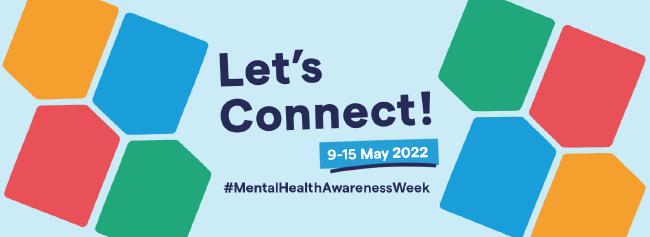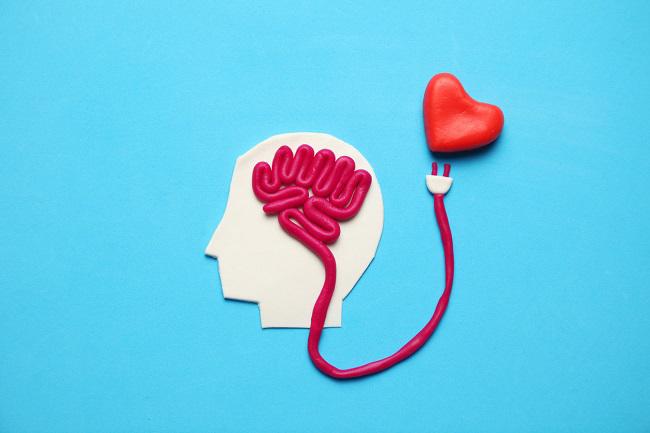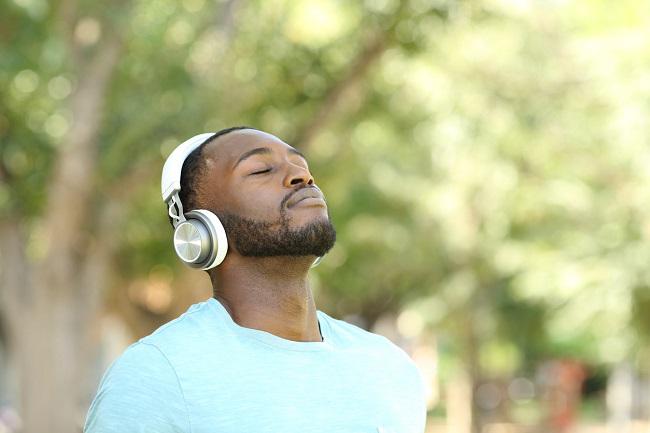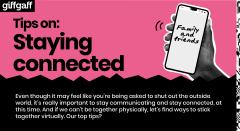Categories
How to tackle loneliness with your mobile
6 minute read

Humans are social creatures. We naturally thrive off social contact and feeling connected to others.
But in our fast-paced world, it can be easy to let social connections slip and loneliness grow into something that’s hard to talk about.
For Mental Health Awareness Week 2022, we’re honouring the theme of loneliness. In this blog we’ll be talking about the importance of connecting with others, and showing you ways to tackle loneliness from the palm of your hand.
What is loneliness?

Some people can be perfectly happy spending lots of time by themselves, but occasionally experience periods of loneliness.
Others could have lots of social contact with friends and family, and even live with their partner, but still feel disconnected from the people around them.
James Harcourt, giffgaff Business Assurance Analyst and Mental Health First Aider, has this great insight into how he handles the feeling of loneliness:
“Recognising loneliness in others, or even with yourself can be difficult. I find that by periodically reaching out to friends or family members on a one-to-one basis for a catch-up conversation can prevent those feelings of loneliness before they’ve manifested themselves. Hopefully it serves the same purpose for the other person too.”
Loneliness can have lots of different causes. These can vary from difficult life events, like bereavement or a relationship break-up, to general upheaval such as starting a new job or moving home.
However, some reasons are harder to pin down, such as feeling lonely at certain times of year. Or sometimes, you can feel a deep sense of loneliness for no apparent reason at all.
But if there are so many potential causes, how can we go about tackling loneliness?
The science of loneliness

Your body values your social needs just as highly as things like thirst and hunger, because millions of years ago social connection was vital to staying alive.
Being together means we are better able to collaborate, find food, bring up children and fight off threats.
In other words, your body believes that being connected gives you a better chance of survival, while being alone could lead to danger. This causes your body to develop feelings of social pain, such as loneliness, to remind you to stay connected to others.
So you see, being social is part of our biology, and loneliness is simply an evolutionary adaptation designed to help you stay healthy and alive.
Now we just need to figure out a way to help ourselves feel connected and keep those lonely warning signals at bay.
How your mobile can help you feel less alone

Used right, your phone can help you feel both better connected, and build mental tools to help you cope with feelings of loneliness.
giffgaff member, kath72, puts it brilliantly:
“Loneliness isn’t just being alone, although that is obviously a major cause of it. My advice? Call someone who lives on their own. If you live on your own, or perhaps are a parent to small children, build human contact into your routine. Be purposeful about making connections.”
Here’s a few ways using your mobile phone can help tackle loneliness, or help you provide much-needed support to a loved one:
1. Connect with a text
Having meaningful connections with those we love can be as simple as a sending a text. Even if we don’t have time to answer right away, those little reminders that we’re in someone else’s thoughts can make a huge difference to your feelings of connection and value.
Whether it’s just a quick hello, or something more weighty you want to get off your chest, connecting over text can ease the pressure of voicing your worries out loud, and help you stay connected even when you’re busy or at a distance.
2. A simple phone call
There’s nothing quite like hearing a friendly voice, especially when you’re feeling lonely.
According to relationship therapist, Simone Bose, when we hear a loved one’s voice, our body reacts by producing oxytocin; the hormone that makes us feel loved and connected.
This means that just a simple phone call could be enough to banish loneliness and brighten someone’s day.
3. Join a community
Community forums are a great way to connect with people who have common interests.
Even if you don’t know them IRL, online communities can give you a strong sense of belonging simply by sharing experiences, advice or being a supportive voice on the other end of a message.
An obvious example is Reddit. But you can also find more niche communities by searching online for forums relating to your hobbies. Or, if it’s just a friendly voice you’re after, why not pop along to the giffgaff community forum? Newbies are always welcome.
4. Make new connections
Connecting through your phone doesn’t have to be solely virtual. You can also use it to build new connections in person.
Apps such as MeetUp and Bumble BFF are great for helping you meet new people and perhaps even arrange to see them in person.
5. Discover your calm
If feelings of loneliness are hard to shake, it can be a good idea to unlock some coping strategies to keep you sane.
Headspace, Calm and Happify are all good for this, teaching you mindfulness techniques in a fun, gamified way. You’ll come out feeling stronger, calmer and hopefully with a clearer mind to help you find practical ways to break the loneliness cycle.
6. Ask for help
There’s no shame in asking for help. In fact, we think asking for help is one of the greatest signs of strength. That’s why we regularly invite The Samaritans to join our dedicated mental health community thread in the giffgaff forum, so you can feel supported wherever you are.
The thread also has lots of links to resources and charities such as Mind and Rethink Mental Health. Giving you access to the support you need, however you want to reach out.
How do you stay connected with your friends and loved ones? Share your tips in the Mental Health Awareness Week community thread. Let’s tackle loneliness together.





